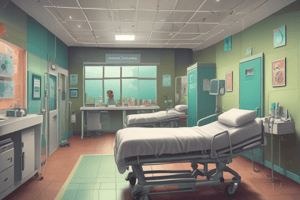Podcast
Questions and Answers
What defines a nosocomial infection?
What defines a nosocomial infection?
- An infection caused by antibiotic-resistant bacteria only
- An infection that is present before hospitalization
- An infection appearing between 48 hours and four days of hospital admission (correct)
- An infection occurring after 30 days of hospitalization
Which group of patients is at a higher risk of acquiring nosocomial infections?
Which group of patients is at a higher risk of acquiring nosocomial infections?
- Elderly individuals and those with compromised immune systems (correct)
- Healthy adults ranging from 18 to 30 years
- Individuals with strong immune systems
- Young children with frequent hospital visits
What is one of the main causes of nosocomial infections among children in intensive care?
What is one of the main causes of nosocomial infections among children in intensive care?
- Venous catheters (correct)
- Frequent physical activity
- Natural immunity
- Inadequate nutrition
Which factor is NOT a risk for hospital-acquired infections?
Which factor is NOT a risk for hospital-acquired infections?
Which procedure carries a significant risk for nosocomial infections?
Which procedure carries a significant risk for nosocomial infections?
What is often the first sign of a nosocomial infection?
What is often the first sign of a nosocomial infection?
What can be an immediate consequence of a localized infection?
What can be an immediate consequence of a localized infection?
Which of the following is a contributing factor to the prevalence of antibiotic-resistant bacteria?
Which of the following is a contributing factor to the prevalence of antibiotic-resistant bacteria?
Flashcards are hidden until you start studying
Study Notes
Definition
- Nosocomial infection refers to infections acquired in a healthcare setting, emerging between 48 hours and four days after admission.
Causes
- Hospitalized patients universally face infection risks due to treatment or surgical procedures.
- High-risk groups include young children, the elderly, and those with compromised immune systems.
- CDC reports a 6.1% infection rate among children in intensive care, mainly linked to venous catheters and ventilator-associated pneumonia.
- Key risk factors for children:
- Parenteral nutrition
- Extended use of antibiotics (over 10 days)
- Invasive devices
- Unsatisfactory postoperative status
- Immune dysfunction
- Common risk factors for both adults and children:
- Extended hospital stays
- Severity of underlying illnesses
- Poor nutritional or immune status
- Indwelling catheters
- Inadequate hand hygiene among healthcare workers
- Emergence of antibiotic-resistant bacteria due to antibiotic overuse
- Invasive procedures commonly increasing infection risk include:
- Urinary bladder catheterization
- Intubation or mechanical ventilation
- Gastric drainage tube placement
- Intravenous (IV) medication or transfusion delivery
Symptoms
- Fever often serves as the initial indication of infection.
- Additional signs may include:
- Rapid breathing
- Mental confusion
- Low blood pressure
- Decreased urine output
- Elevated white blood cell count
- Urinary tract infections (UTIs) may cause painful urination and cough difficulties.
- Localized infections can manifest as swelling, redness, and tenderness near surgical or open wounds, potentially advancing to severe muscle tissue destruction and sepsis.
Studying That Suits You
Use AI to generate personalized quizzes and flashcards to suit your learning preferences.



